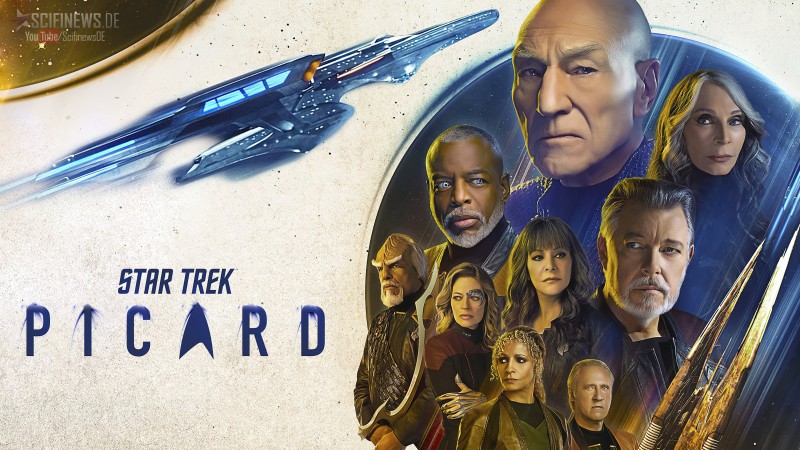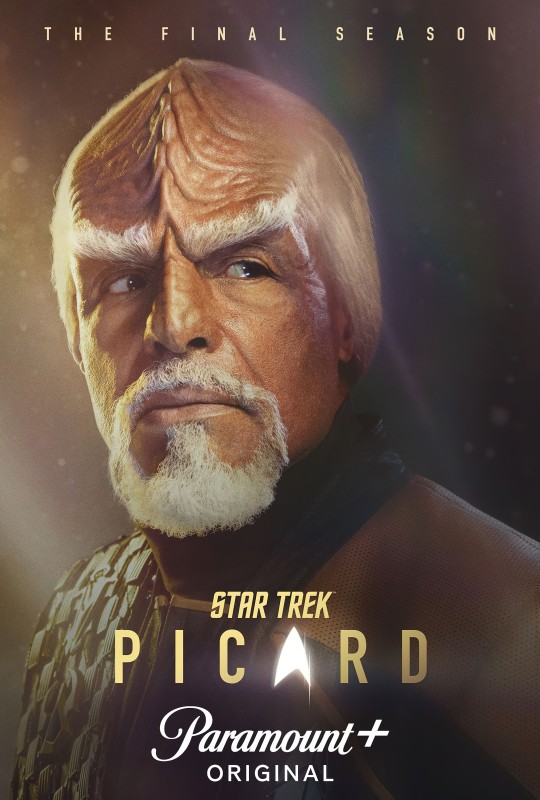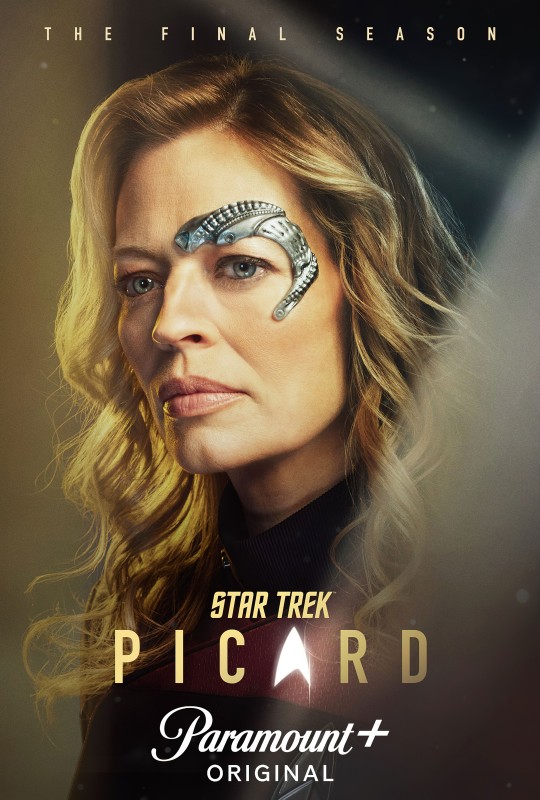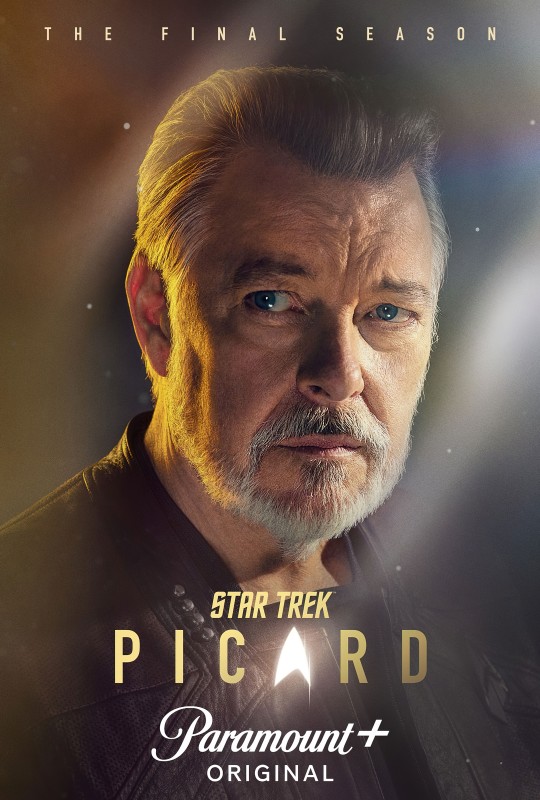
Die neue Star Trek Buchreihe "The Lost Era" befasst sich mit Ereignissen, die zwischen ST6 und dem Beginn von TNG stattfanden. Hier haben die Autoren also durchaus Raum für spannende Geschichten und genau das ist Keith DeCandido mit seinem Roman "The Art of Impossible" gelungen. Inhaltlich zieht sich die Geschichte über 18 Jahre hinweg und erzählt von dem kalten Krieg zwischen den Cardassianern und den Klingonen anfang des 24. Jahrhunderts.
Nun wurde endlich eine lange Leseprobe online gestellt. Wer des Englischen mächtig ist, dem sei gesagt: viel Spaß!
Star Trek: The Lost Era
Mass-Market Paperback / October, 2003
0-7434-6405-2
Written by Keith R.A. DeCandido
Excerpt:
In the quarters on the Carthage assigned to Talen Kallar, an alarm went off. The alarm emitted from a small device implanted in the ear of the cabin's occupant, so only he heard it. He barely hesitated from his assigned task of organizing files from the notes that had been taken during the most recent negotiating session. Kallar had a reputation as a physical bumbler, and was more likely to trip over his own feet than walk a straight line, but he was good at the dreary paperwork tasks that always fell upon interns. As a youth, and the lowest-ranking person in Legate Zarin's delegation, those duties fell upon Talen Kallar.
However, the alarm was not intended for "Talen Kallar," for the alarm heralded a signal from a device crafted by the organization that had created Talen Kallar. The name and background credited to Kallar in fact had been a fiction written by the Obsidian Order as a cover for one of their newest agents, a recent graduate of Bamarren named Corbin Entek.
While "Kallar" finished coding the latest file for Olett to look over, Entek made mental note of the fact that the alarm indicated that people had entered Captain Vance Haden's ready room.
According to the ship's chronometer, the next communications sweep would be in one minute. After that, Entek had a ten-minute window to activate the transmitter in the same device that had sent the alarm. The Carthage's communications system did an automatic sweep for unauthorized transmissions every ten minutes.
To Entek, that was one of many reasons why he knew that Cardassia would eventually dominate the galaxy. If the Federation--arguably the greatest power in the quadrant--had such lax security on one of their military vessels, they would be ripe for the taking. There was no reason why those scans couldn't be perpetual, leaving no window for such espionage as Entek was performing. Entek's original theory, when he was told of this odd security measure, was that it was to conserve power. However, the very room in which he sat proved that to be a false assumption--the Carthage was a momument to wasted energy, from the overly large rooms to the availability of separate quarters for each member of two full negotiating teams.
The other proof of lax security was the very manner in which Entek had planted the device. The captain had ordered the first officer to give Legate Zarin and his staff a tour of the Carthage--as if they were vacationers visiting a museum! Entek had actually laughed in the human commander's face when she said she was taking him on that tour, and only a quick conversion of that laugh to a hysterical giggle had enabled him to maintain his cover as a callow youth.
Of course, Entek's supervisor, whose name Entek did not know, would have said that he was a callow youth, and he had only gotten this assignment because Zarin would be on the lookout for an Order agent in his midst, so they needed to put in someone the legate would never suspect under any circumstances. Since Zarin generally believed that nobody under the age of forty had any sense or business doing anything responsible, the ideal infiltration candidate was the most youthful member of his delegation.
That cover also provided his means of planting the listening device, which was the size of Entek's thumbnail, under which he had stored it. When the tour took them to the captain's ready room, "Kallar" tripped over the carpet, taking advantage of his clumsy maneuver to place the device in a corner. Its surface was sensor-blind--the only way it could be detected was when it transmitted an audiovisual record of the room to the receiver in Entek's ear.
The chronometer indicated that the time for the communications scan was complete, so Entek removed the device from his ear and plugged it into his handheld computer.
His computer screen lit up with the image of a tharul's-eye view of the ready room, the feet of the room's occupants large, their heads comparatively small. Entek could barely see the perspectively tiny head of Vance Haden from his position sitting at his desk. Also present were Commander Rachel Garrett, the first officer who had provided the "tour," Lieutenant Ian Troi, the ship's science officer, Lieutenant Elias Vaughn, a consultant from Starfleet Command, and Ambassador Curzon Dax.
Entek went through his mental list of facts pertinent to the four humans and one Trill in the room. Troi had recently married an aristocrat on Betazed, a planet full of pacifist telepaths that Entek had always thought would be among the first worlds to fall when the Federation either collapsed on itself like the bloated mess it was or was finally overtaken by a superior force--ideally, Cardassia.
As for the others, Haden was a war veteran, having fought against the Romulans years before to the Tomed Incident, with a reputation for being somewhat blunt. Garrett was an expert fencer, and had had several dealings with the Klingon Empire over the years. Her experience was as nothing compared to that of Dax, who was one of the negotiators at the Khitomer Accords, and had forged personal bonds with several prominent Klingon military figures.
The only person about whom Entek knew nothing of consequence was Elias Vaughn. His official role was as a consultant, a functionally meaningless term that usually signified intelligence work. The Order's knowledge of Federation intelligence was scattershot at best, but Vaughn wasn't part of any of it that he was aware of. We'll need to change that.
"Are you sure about this?" Dax was saying. The Trill sounded agitated.
Speaking with a certain confidence, Troi replied. "About the Cardassian ships, yes. About the Klingon ships, not so much."
Entek frowned. His first thought was, What Cardassian ships? The only Central Command ship in the area was the Sontok.
"But it fits the profile," Garrett was saying.
"That's ridiculous," Dax said, making some kind of gesture that Entek couldn't make out from his vantage point. "The Klingons wouldn't hide out like that."
"What, it wouldn't be honorable?" Haden's words were laced with sarcasm.
Dax stared at the captain. "As a matter of fact, it wouldn't. They've been completely up-front with us."
"C'mon, Ambassador," Garrett said. "You know as well as I do how fanatical Klingons get when it comes to anything sacred. Honor's all well and good, but they're not going to give up Ch'gran without a fight, and they're not going to count on winning that fight over a negotiating table. Look what happened thirty-five years ago."
Archly, Dax said, "Unlike you, Commander, I was there thirty-five years ago. I wrote parts of the Khitomer Accords, so kindly don't try to lecture me on the events leading up to them."
To her credit, the commander was wholly unintimidated by the ambassador's posturing. "Then you should remember that even coming to the table was too aruduous a concept for some Klingons to wrap their minds around. So much so that they assassinated a perfectly good chancellor. If they can do that, I don't think hiding a fleet nearby in case things don't go their way can be considered out of character."
"This will get out of control quickly," Vaughn said. Entek noted that the human spoke in an even tone, and also that the lieutenant's hands were bandaged. "The minute either Zarin or Worf decides that things aren't going right, that one will call in the cavalry, and five minutes later, the other one will call in his, and this whole thing will blow up in our faces."
Calmly, Haden said, "You're projecting a bit, Lieutenant."
"I don't think so, sir."
"Oh you don't, do you?" Haden spoke as if he were lecturing a child. In fact, his tone reminded Entek a great deal of that of his Order supervisor. "We know there's something that's at least sixty-five percent likely to be a Akril-class ship in the Betreka Nebula. We know there's a reading that might indicate a fleet of cloaked Klingon ships. Or, conversely, the Hoplite stumbled across some debris from the battle here three weeks ago and those subspace variances are just background radiation, and your overactive imagination is transforming them into a pair of fleets."
It took all of Entek's will power not to curse out loud.
Dax smiled. "I wouldn't worry on that score, Captain. I doubt anyone's accused the lieutenant of having an overactive imagination." His face grew serious. "But you're both right. We don't know enough, and it is precisely because of that lack of knowledge that the situation is already out of control."
"We need to call in reinforcements," Garrett said. "We'll be a sitting duck if those fleets decide to go at it."
"Too risky," Haden said. "I don't disagree with you, Number One, but Monor and Qaolin have already have their bowels in an uproar because I let the Hoplite out in the first place. They're keeping a close eye on us."
Entek noted the phrases "sitting duck" and "bowels in an uproar" for addition to their growing linguistic database on the Federation. Both had definitions that seemed obvious from context, though Entek tagged them both for verification and a tracing of etymology.
Dax shook his head. "What we need to do is put our cards on the table and call their bluff."
"That's a quaint metaphor," Vaughn said with a level of snideness that Entek couldn't help but admire. He also made a note for the Order to determine what that metaphor was--it was obviously some kind of contest involving cards, but that hardly narrowed the field. "But I doubt they're bluffing."
"I'm sure they think that, too--and will continue to do so, right up until they have to actually play their cards. But one reason why I think they've assembled these fleets in the first place--" he looked at Haden "--assuming they have assembled the fleets--is because they're far from home. Reinforcements beyond whatever they're hiding behind cloaks or in nebulae are days away, and probably not easily diverted. I'm not sure either Zarin or Worf will be willing to start something they can't finish."
"I've read the transcripts of the meetings so far," Vaughn said. "I haven't seen anything to indicate that either side is going to budge. Where does that leave us?"
"I have no idea where it leaves you, Lieutenant, but it leaves me with the winning hand. I just have to play it."
Again, the alarm beeped. The ten-minute window was about to close. Cursing, Entek turned off the listening device. He had been hoping to hear more, but he dared not risk a second transmission. Another one so soon might be detected by the Carthage's communications officer even without the automatic scan.
Besides, he'd heard enough. Haden may have had his doubts, but Entek didn't. Central Command had objected to negotiations from the beginning. It was completely in character for them to assemble a fleet in secret and hide it in the Betreka Nebula, not bothering to inform the Order or the Detapa Council about it.
To Entek's frustration, there was nothing he could do. His job was purely to gather intelligence--and this meeting had gleaned a great deal, beyond the significance of this particular mission. He had neither the means nor the ability to act on any of it, though. Indeed, he would not even be reporting back to his supervisor until he was back on Cardassia.
Assuming we survive this negotiation, he added dolefully, a state of affairs which hadn't been in doubt until Entek overheard the meeting in Haden's ready room.
Entek removed the device from the handheld computer and placed it back in his ear. Then he called up his ongoing report for the Order. He had a great deal to add to it now.
* * *
"Enter!" General Worf spoke the single word in the Klingon language when the doorchime to his quarters sounded. As expected, Lorgh walked in.
"You sent for me?" his aide who was not his aide asked.
Seated at the too-comfortable chair Starfleet had provided, Worf reached onto the table that held his workstation and grabbed a mug. He handed it to Lorgh. "Drink with me, Lorgh."
Taking the mug, Lorgh asked, "For what reason, General?"
"I have just been informed that my son has taken a mate."
Lorgh smiled. "For that, I will even drink Starfleet's warnog."
"I appreciate the sentiment, but so great a sacrifice will not be required." The general indicated the bottle of bloodwine on the table. "I have been saving this for a special occasion."
Peering at the table, Lorgh saw that the bloodwine was from the Ozhpri vintner--one of the finest in the Empire. "A worthy vintage." He held up the mug. "To your son."
"To Mogh, son of Worf, and soon to be mate of Kaasin, daughter of Prella."
They both drank. Worf reveled in the oily slickness of the bloodwine that seemed to coat his throat as it went down.
"May they both bring you many strong children to perpetuate your House."
Worf laughed. "Well said, though I will settle for at least one heir." He took another gulp of wine, then regarded his aide. "At the reception, you said that the Council preferred to fight this battle across a negotiating table. I am beginning to think that such is a battle we cannot win. The Cardassians refuse to even acknowledge the importance of Ch'gran. They denigrate it, call it a mere pile of wreckage. It has been exceedingly difficult to keep from killing Legate Zarin. I believe that we will never reach an understanding. We may need to call in the fleet."
Lorgh shook his head and walked over to the cabin's window, which had a spectacular view of the Betreka Nebula. "That may satisfy our honor in the short term, General, but it will not gain us Ch'gran--or much else. The Cardassians are strong, and getting stronger."
"As are we," Worf said.
"Yes, but they grow stronger from a position of strength--they are expanding, improving their resources, and their economy can support a military buildup. Cardassia has gone from an unknown and irrelevant nation to an important participant in quadrant politics in a very short time, General. They build on a solid foundation."
The general snarled. "Whereas we rebuild from weakness."
"Sad, but true, sir. The Defense Force's shipyards have lain dormant for several turns. Vessels that should have decommissioned years ago still fly the stars, some being held together with little more than targ guts and wishful thinking. A war with Cardassia is not one we can win."
Worf shook his head. "I fear you are correct." He drank down the rest of wine and poured more. "We have become too reliant on others--the Federation, the Romulans..."
"What have the Romulans to do with this?"
The general gulped his bloodwine. His thoughts took a dark turn, and he wondered how much of Ozphri's finest he would need to imbibe before he was sufficiently drunk to deal with those thoughts. "Many of our finest Houses have fallen into debt since the destruction of Praxis. Are you familiar with the House of Duras?"
"Yes. As I recall, they brokered many technological exchanges with the Romulans when we were their allies."
Worf nodded. "Our Houses have long been in conflict. Their House head is an old man now. His son, Ja'rod, has rekindled those old ties with the Romulans now in the hopes of alleviating debts they have accrued. Further--they have introduced other families to Romulan sources that can aid them."
"I was not aware of this," Lorgh said, and Worf wondered if he was honest.
"Your superiors should be. If not, they are fools, and we are in worse trouble than I thought." He leaned forward. "Do you not see, Lorgh? Our people are becoming weak, desperate. Honor must be served, but honor does not put food on the table. It is no easy thing for a noble-born Klingon to starve like some laborer in the lowlands. Finding Ch'gran is the thing that can save us, remind us of who we are." He leaned back in the irritatingly pleasant chair and gulped down the rest of his bloodwine. Then he threw the mug across the room; it clattered against the wall, but the noise was muted by the room's carpeting. Damn Federation even spoils a perfectly good gesture of anger. "If we lose that, too, after losing so much, I fear for the future of the Empire."
"Our future is strength," Lorgh said with the confidence of youth. "It is our present that is of concern. We will be great once again."
"But at what cost? Will we be ruled from Qo'noS, Romulus, or Earth?"
Lorgh had nothing to say to that.
The doorchime then rang again.
Worf hadn't been expecting anyone else, but he said, "Enter," this time in the human language.
This proved wise, as the door opened to Wai-Lin Li, the chief of security for the Carthage. A short woman with a compact form, she moved with a lithe grace that bespoke fine martial skills. Worf would have expected no less from someone in charge of security. While most humans were soft, Starfleet rarely put people in positions for which they were unsuited, and the job of security chief necessitated a certain physical prowess. "General Worf, I need you to come with me, sir. Ambassador Dax has called an emergency negotiating session."
"What for?"
"I don't have that information, sir. I was simply ordered to escort you to the briefing room."
"Very well." Worf rose and exited his quarters, Lorgh falling into step behind him.
When they arrived at the briefing room, Worf noticed a much larger security contingent present. Usually two guards were posted inside the room during conferences, which Worf had thought a reasonable precaution. Now, however, four guards stood inside the room, with two more posted outside.
I do not like this, he thought, and shot Lorgh a look. Something has changed. Worf knew that the Carthage had sent a shuttle into the nebula, which had then been damaged and had returned to the ship only two hours ago. Initially, the general had believed the captain's claim that they were engaged in scientific research--the Federation never passed up an opportunity to stare at natural phenomena for long periods of time--but now he wondered if something else was going on.
He also wondered if the shuttle had detected the fleet that lay in waiting. No, the Federation has no way to penetrate our cloaking shields.
Worf noted that Li took up position in the room as well. Dax was in his usual seat at the center of the table. "What is the meaning of this?" the general asked the ambassador.
"We'll discuss it when Legate Zarin arrives." Dax's tone was much harder than usual.
Escorted by another member of the Carthage's security force--who also took up position, bringing the number of guards in the room up to six--Zarin and his female aide came in. "What is the meaning of this?" he asked, a parrotting of Worf's own words that made the general a bit uncomfortable. But then, it was a reasonable question for either of them to ask. "I was in the midst of very important work--"
"This is the only work that should concern you right now, Legate," Dax said, "and it's taken on a new wrinkle."
"A 'wrinkle'?" Zarin asked.
"Obviously something important has changed, Ambassador," Worf said. "Kindly tell us what it is."
Then Dax smiled that insincere smile that Federation diplomats were particularly adept at. "I'll be happy to, General, Legate. These negotiations are over. The Federation has unilaterally decided to take over Raknal V. We refuse to accept any claim made on the world by either Cardassia or Qo'noS, and any attempt to refute our claim will be met with force."
Zarin quivered with rage, and Worf felt similar anger coursing through his own veins. I knew that trusting these negotiations to this charalatan was unwise. "Great" Curzon Dax indeed.
"How dare you! You have no more claim to Ch'gran than this petaQ!"
"I can assure you, Ambassador, that this act will not go unchallenged."
"I'm sure it won't, Legate," Dax said. "In fact, I'm sure you'll start by leaving this room and having Gul Monor fire on the Carthage--just as the general here," he pointed at Worf, "will instruct Captain Qaolin to do likewise. But the Sontok and the Wo'bortas are still under repair, and the Carthage is ready for a fight. Captain Haden's record in battle is not inconsiderable, either. No, your best bet would be to call in reinforcements. Luckily, there's a Klingon fleet a few million kilometers away under cloak that can destroy the Carthage and move on to claim Raknal."
Zarin turned angrily on Worf. "What!? You agreed to bring only one ship! Typical of Klingons--you claim to be creatures of honor, yet you cannot keep to a simple agreement. We should have known better than to think you capable of negotiating in good faith."
Worf, however, regarded Dax. It seems I have underestimated the Federation. I am a foolish old man to have let them outmaneuver me like this. He could feel Ch'gran slipping away from him--and with it, all the work he had done to climb out of General Chang's shadow being undone.
Dax walked around to stand between the two negotiators. "Of course, Legate, you won't be able to take such an action sitting down, as it were. So you'll have to summon the reinforcements you have in the Betreka Nebula."
Blinking, Worf looked at the legate. Based on the expression on Zarin's face, Dax spoke the truth. "You dare to accuse us of not negotiating in good faith?" Worf asked.
"We simply wish to protect our claim," Zarin said weakly.
"And we want to restore a sacred relic to our people! Perhaps we have violated the letter of our negotiating terms, but we did so out of a desire to see justice done! Ch'gran is Klingon, even you cannot deny that! We fight for our heritage. I wonder what feeble excuse you have for breaking your word."
Dax said, "Obviously, you cannot resolve your agreements without fighting each other, so fight each other you must. Tear yourselves to pieces. Sacrifice all the gains you have made over the past few decades. Deplete your economies in a costly war that will drive you into debt and devote your forces to a distant region. Plunge your nations into ruin."
"You underestimate Cardassia," Zarin said smugly.
"And you, sir, underestimate the Klingons," Dax said. "They will fight you until their dying breath to reclaim Ch'gran. This is not a conflict either of you can win."
Dax said nothing Worf had not already thought--or discussed with Lorgh. "Do you have an alternative, Ambassador, or do you simply enjoy stating the obvious?"
Again, Dax smiled. "Actually, I do--have a solution, that is, though I will confess that sometimes stating the obvious has its joys. Have a seat, gentlemen." Dax himself sat in one of the chairs, activating the triangle viewscreen at the table's center.
Worf gave Lorgh a nod, and took a seat on one end, Lorgh doing likewise in the chair perpendicular to his own. He noticed that the screen gave a topographical view of Raknal V.
Zarin and his aide remained standing. "I refuse to continue these negotiations. The Klingons--"
"Have a seat, Legate," Dax snapped. "Right now, the Carthage has its phasers trained on the Sontok--with photon torpedoes," he added, "targeting the Wo'bortas. The only thing keeping Captain Haden from giving the order to fire is my word. All I have to do is nod to Commander Li there, and the Carthage will fire."
"You have no right--"
Dax rose and stood face to face with Zarin. "We have every right, sir. You have both violated the terms of the negotiations. The Federation is wholly justified in viewing this military buildup as a hostile act." The Trill's nose was now almost touching that of the legate. "Now kindly--sit--down."
Zarin sat down. Worf revised his estimate of Curzon Dax upwards slightly.
Then the insincere smile came back, and the Trill retook his seat. "What I propose is simple. Both the Klingon Empire and the Cardassian Union have a claim on Raknal V. I think it's patently clear from the joyous times we've spent in this room that neither side is willing to alter its negotiating position, and neither of you would even be at the negotiating table if you were willing to go to war over this. So you need to find a third option--one that allows you each the opportunity to legitimize your claims."
Worf's estimate starting sliding back downward again. "If you have such an option, kindly state it."
"For once, I agree with the general," Zarin said. "You may like the sound of your own voice, Ambassador, but I find it grating."
"Sticks and stones, Legate," Dax said, a phrase that Worf found meaningless. "Sixty years ago, the Federation and the Klingons signed the Organian Peace Treaty. The conflict that predated the treaty involved the dispute of several border worlds. One of the terms of that treaty was that each nation would be given the opportunity to develop those worlds and prove their claim to be the strongest."
Worf frowned. "You suggest that we do the same for Raknal?"
"Yes." Dax pointed to the rendering of the planet on the viewscreen. "The world has two continents. What I propose is the following: The northern continent will be under the direction of Cardassia. You will treat that continent as if it were one of your colony worlds--set up some kind of governmental body and proceed accordingly. The southern continent will be under the jurisdiction of the Klingon Empire under the same terms. Both the Klingon governor and the Cardassian ruling body will make regular reports to me. When I am satisfied that one nation or the other has proven itself best able to exploit the world's resources, I will make a decision as to whom it will be ceded."
Zarin stood up. "Preposterous!"
"On the contrary, Legate. Whoever gains the planet will have earned it. Rather than simply gaining it by stumbling across it--or," he added with a glance at Worf, "by the happenstance of one's ancestors having stumbled across it centuries ago--you will have proven that it deserves to belong to you. Or, as the case may be, not."
Even as Zarin fumed, his lips quivering in anger, Worf found himself grudgingly admiring Dax's solution. It was not ideal, but this, at least, was a battle the Empire could win. Bringing worlds under our heel is something at which we have always excelled.
Worf noted that the Cardassians were being given control of the continent on which the Ch'gran remains had been found. That was wise--it meant the Klingons would have to gain the world in order to gain the remains. However, it did raise a point. "How do we know that the Cardassians will not simply take Ch'gran?"
"The Ch'gran site is to remain untouched until the final determination is made. Any violation of that will result in the unconditional ceding of the world to the Klingons."
Zarin's lips were still quivering. "What possible reason do we have to agree to these obscene terms?"
Dax looked up at the legate. "The only reason you need, Legate--lack of desire to pursue any of the alternatives." He leaned back in his chair. "I don't expect either of you to be able to answer right away. You will need to consult your governments. We will reconvene here in two weeks to finalize the agreement."
"Assuming," Worf said as he stood, "that there is an agreement."
Again, Dax smiled. "Assuming, yes, General. Oh, one other thing." He looked at both of them. "Call off your fleets. Captain Haden has already called for more ships--they'll arrive by tomorrow. I expect that both the cloaked fleet and the ships in the nebula will be gone by the time they arrive."
Zairn exhaled loudly, his lips practically on overdrive, as he turned and left, the aide right behind him, two guards behind them.
Worf watched them depart, then looked back at Dax. "You are playing a dangerous game, Ambassador." Then he smiled. "I admire dangerous games."
"Thank you, General. We will speak again soon."
With that, the Trill turned and left.
Lorgh looked at the general. "Would you still rather Riva was assigned?"
"Yes," Worf said without hesitation. "Dax is still an arrogant petaQ. A more clever one than I thought--but the designation stands."
Laughing, Lorgh said, "Perhaps. But he does understand the Klingon heart. We will fight for Ch'gran, and we will be victorious. And the Empire will be great once more."
Youth, Worf thought with disdain. "You may be right, Lorgh. Time will be the judge."
"It always is, General."
* * *
"Do you honestly believe this is going to work?"
Dax looked up from his raktajino and his padd. He sat in the Carthage lounge, reading over the draft of a resolution that had been awaiting his perusal for the last week. Minister T'Latrek had sent several communiqués to him asking for his approval of the text, without which the Calabrese Treaty could not go through. Finally, with a lull in this Betreka Nebula nonsense, he could do so.
Now, the slim form of Elias Vaughn stood over him, a querying look in his penetrating blue eyes. Vaughn had, at least, not actively ruined the negotiations, thus not fulfilling the fear Dax had expressed to Garrett, but neither had he contributed anything of use. As with most of his ilk, he was a waste of time and space, and Dax saw no reason to let such a waste get in the way of his work.
"Lieutenant! What a complete lack of pleasure it is to see you. Please, don't have a seat and go away."
"You haven't answered my question."
With a snort, Dax said, "I'm under no obligation to answer questions posed by Starfleet lieutenants, Mr. Vaughn."
"Consider it practice--because you can be assured that I'm not the last person who'll ask it."
Dax closed his eyes and sighed. In that, at least, Vaughn was correct. But Curzon Dax was used to his judgment being questioned. He had hoped that as he got older, as his reputation for success improved, he would no longer be second-guessed so much, but if anything the tendency of others to do so had increased over the years. "Yes, Lieutenant, I honestly believe this is going to work. There's even precedent. Sherman's Planet, Cappella IV, Neu--"
"And you truly believe that this is the same thing?"
"Of course it isn't, don't be ridiculous," Dax snapped. "But the basics are still sound. Neither side is willing to commit to a war. Besides, this provides the competition of such a conflict without the concomitant loss of life. I can't see how anyone would view that as a bad thing, myself."
Vaughn shook his head. "How old are you, Ambassador?"
"Older than you think," Dax said cryptically, since one answer to that question would be a three-digit number. That point-one percent of the Trill population lived in symbiosis was not public knowledge offworld, nor that Dax was one of that rare number. Though various Daxes over the years had revealed that secret, Curzon saw no reason to bring Vaughn into that circle.
The lieutenant didn't look happy with that reply, but did not pursue it. "Then you should know better than to believe it will be as simple as you think. Your solution is too neat, and is more than likely going to blow up in all our faces."
I've had enough of this. "Your years of experience in diplomacy have taught you this, eh, Lieutenant?"
"No, but your years should have taught you the difference between two sides that aren't willing to commit to war and two sides that aren't able. This is a case of the latter, not the former, and time isn't on our side. What you've proposed is a compromise, and compromises tend to please no one. Neither the Klingons nor the Cardassians have given any indication that they respond well to not being pleased, and the longer this idiocy goes on, the stronger they'll be, and the more likely they are to vent their displeasure in bloody ways."
Dax sighed. Let me rephrase--I had enough of this when he came on board. We're now up to more than enough. "Lieutenant, I've been doing this for longer than you've been alive. I also know how Klingons think. They will fight with honor for the right to take this planet, and I'm sure the Cardassians will do likewise. Whoever does gain claim to this world will have earned it. There will be no bloodshed, and there will be no displeasure. Now if you'll excuse me, I have actual work to do."
With that, Dax turned his attention back to the resolution.
"Why not simply cede the planet to the Cardassians?"
That got Dax's attention just from the sheer ludicrousness of it. "I beg your pardon?"
"Let's look at this objectively for a moment. The Cardassians are the ones who charted and discovered the planet, they're the ones who found the Ch'gran remains. The Klingons only even knew about it because they were spying on the Cardassians. What possible reason do you have to even give the Klingons a chance at this?"
Dax set the text of the resolution down. Garrett had suggested the same thing, of course, but what sounded reasonable coming from the commander's mouth sounded totally idiotic from the lieutenant's. "Because if we don't, there will be a war. Just because two parties are unable to fight a war, as you put it, doesn't mean they won't make an attempt at it. It's all well and good to say, 'let's look at this objectively,' but the Klingons can't do that. This relic is sacred to them. Believe me, Vaughn, this is the only alternative to a war that will, in all likelihood, tear this quadrant to pieces." Having nothing more to say, he picked up the padd and started reading again.
"Perhaps you're right, Mr. Ambassador," Vaughn said in a tight voice. "But I've been in Starfleet long enough to know that I have a good instinct for this sort of thing, and that instinct is telling me that this cannot come to a good end."
Seeing nothing to be gained by replying to Vaughn's arrogance, Dax simply continued reading until the lieutenant finally took the hint and walked away.
Quelle: PsiPhi.org









Empfohlene Kommentare
Keine Kommentare vorhanden